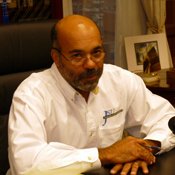As Jackson State University President Ronald Mason Jr. shook hands at a forum this morning at Koinonia Coffee House in Jackson, he sought to quell concerns about a possible HBCU merger idea he floated to legislators last month. He maintained that his proposal was merely "an idea that was leaked."
"There was no bill or a proposal made to any board; it was a discussion of just one possible answer," Mason told the Jackson Free Press. "There are serious challenges, and I 'm just the worker, not the decision maker. My job is to give my best analysis and my best advice."
Last month Mason approached legislators with the idea to downsize historically black colleges Alcorn University, Mississippi Valley State University and Jackson State University into a specialized campus named Jacobs State University.
Mason maintains that his multi-page proposal and PowerPoint slide show, first reported by the Jackson Free Press, were a private idea and not ready for public input.
"It wasn't a formal proposal, it never was. It was a long way from showing to the public," he said.
Sen. David Jordan, D-Greenwood, spoke out against Mason's proposal at a recent rally to support HBCUs at the state Capitol comparing him to a "philistine."
This morning Jordan said that he still opposes Mason's plan and has declined a request from Mason to meet this week to discuss the matter. "I disagree with his proposal, and I know where he stands," Jordan said. "I have nothing more to say to him on the matter."
At Koinonia's Friday forum, Mason tried to distinguish his idea from Gov. Haley Barbour's proposal to merge the same three black universities to save $35 million. Mason said the idea behind Jacobs State was to maintain the three universities while moving programs and resources to save cost, while operating under the umbrella of a single-name university.
Mason said the traditions and history of each campus would remain in intact unlike the changes in Barbour's proposal.
Michael Robinson, a JSU alumnus, said Mason's idea is to preserve HBCUs while dealing with financial challenges. "(Mason) wants to make agencies stronger. In these tough economic times, he believes it's better to stand as one unified entity as opposed to three," Robinson said. "The problem is we are caught up in traditions and resisting change."
Mason said he has no plans to hold community meetings on the issue, but will accept invitations to speak publicly about it.
He emphasized that financial constraints will force the public to face the issue of merging and consolidation efforts.
"We have been trying to figure out how to deal with this for the past two years," he said. "When people see that jobs are at stake, there is no amount of PR effort that can mitigate fears. At some point, just like this, you have to confront the situation and work your way through it."



Comments
Use the comment form below to begin a discussion about this content.
comments powered by Disqus